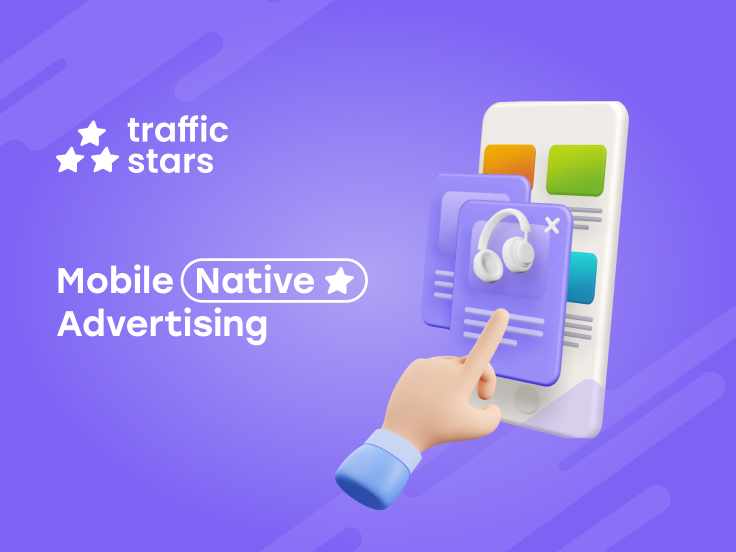
What is native advertising?
It seems easy to understand the basics of using native ads - just work on creating unobtrusive texts and implement them on your pages. However, in reality, the situation requires a more in-depth study of the topic. Efforts affect the results of using the modern format.
Native ads are ads that:
- integrated seamlessly into the pages of a website or social platform;
- are relevant to the content of the pages and related to the topic of the text;
- appear on search pages, under or above the material on the web.
The next misconception is that the ad format is difficult to recognize. In fact, it is very easy to distinguish a regular publication from a corporate offering. According to current regulations, advertisements must contain notes about the sponsor or the application where the publication was created.
In social networks, native promotion has taken on a special form. So, users are scrolling through a news feed, and the platform recommends viewing a paid ad. It is easy to notice it, but you don't always want to interrupt the viewing, thanks to the ingenuity of marketing experts.
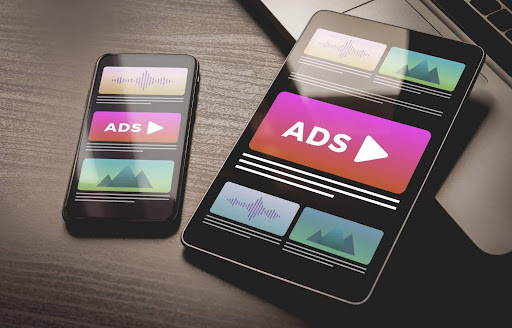
How does native advertising work?
The principle of mobile native advertising is simple: consumers see the content and perform targeted actions (order goods, go to the site, or leave contacts). It is necessary to make preliminary preparations to make this system work effectively.
Before launching a campaign, you will need to create appropriate materials - videos with interesting content, images with a clear message and other options. Since there are many formats, this side of the promotion will be disclosed below.
Market research will help attract the audience's interest to appreciate the proposal. As a service provider, you can create a detailed portrait or assess the existing demand for goods. This way, you can move on to the next point of the strategy - to publish the ad.
Publishing creatives is available in several ways. Social networks offer to pay to promote products and then recommend materials to the appropriate audience. In addition, marketing professionals use the network of technology to publish materials on thematic resources.
A potential buyer searches for offers online and then finds your advertisement. Since the format is different from other options, there is no irritation. Consumers follow the instructions and start working with the author company.
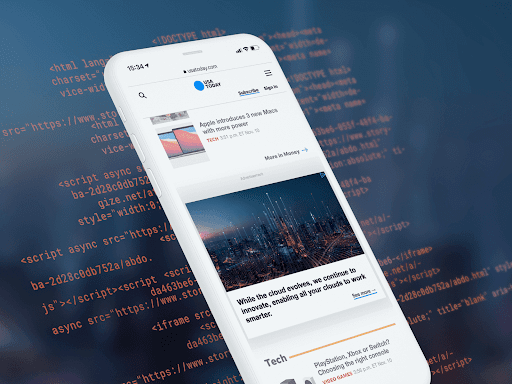
The differences between native and banner ads
Banners that are actively used in the media space are causing consumer fatigue. Some of them have banned the display of ads on websites, while others have acquired the skill to ignore any banner headlines. All this reduces the effectiveness of traditional campaigns.
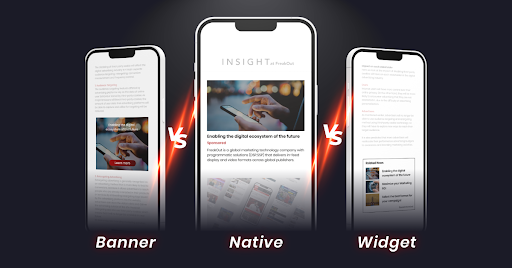
The difference between native ads is that they match the style of the page. Advertising looks organically on the page, so it is a little more difficult to notice it. The absence of colorful elements does not allow the "banner blindness" mode to turn on, which makes the format more cost-effective and efficient.
What are mobile native ads?
Ads on mobile devices display with some changes. Banners become hardly visible, and text loses readability. Moving to native advertising on mobile allows you to overcome these drawbacks. It helps create campaigns that:
- are appropriate for screen sizes, regardless of the device's operating system;
- retain readability and benefit potential audiences;
- replicate the style, shape, and layout of the page where the unit is placed.
Sponsor marks, links to third-party sources, and the companies' signatures that created the ads help detect them. The text is made invisible to visitors so they don't notice it.
Types of native mobile ads
The format of advertising publications is diverse. Marketing specialists recommend using pop-up tips for promotion. Unlike push notifications, the new approach justifies itself and looks more attractive for large and medium-sized brands.
In addition, native ads are created with the help of:
- Product ratings. This way, marketing professionals unobtrusively talk about the product that needs to be sold.
- Recommendations. The recommended content is distributed to those users who are part of the brand's target audience.
- Cards. Badges on maps do not surprise anyone because they have always been there. Today, marks are used to promote a brand, company, or store.
- Videos. Fans of modern games are rewarded for watching videos.
- Content. Recommended articles of a website or blog are categorized as native ads. The user either accepts the offer or clicks through without paying attention.
Push notifications are ineffective, although their use is still allowed. Modern users open messages in this format less often, so it should not be taken seriously.
Advantages of mobile native ads
The widespread availability of smartphones with Internet access has made life easier and more complicated for marketing specialists simultaneously. It's because promotional campaigns require a rethinking of information delivery options. The first native advertising mobile appeared in this way. Attention to the current market situation makes us wonder whether it is worth spending time on the format implementation.
1. The click-through rate (CTR) is higher than banner ads
The clickability of native publications is much higher than other media methods. Viewing ads from mobile allows you to go to the recommended page and perform targeted actions instantly. It is possible to increase CTR thanks to:
- a message design that is consistent with the overall style of the site;
- the belief that a specific source provides all information;
- the problem of "banner blindness" does not arise.
A random click on an image and link leads to a deal between the customer and the company. You should not miss this opportunity.
2. Mobile native ads foster high purchase intent
A user searching for goods or products online is ready to buy/order/use the offer. Your job is to encourage them to do so, and that's where organic ads come in. Quality images, high rankings, and customer reviews help reinforce intent and turn it into action. It can all be placed in one publication without the battle between native vs mobile advertising.
3. Mobile native ads combat ad fatigue
The absence of ad units doesn't always mean there aren't such units. Perhaps the advertiser uses the original page style to eliminate the "banner fatigue" effect.
Brand information is valuable because it stays relevant for a long time. The content evaluation will be driven by real data, not by the fact that they are tired of ads
4. Some native ad types are immune to ad blockers
Blocking ads from advertisers costs money. Usually, users who work on online portals and platforms resort to ad blocking. As experience shows, built-in blockers do not cope well with their tasks, so publishers have a chance to attract the audience's interest.
Relevant content on the page with ads builds trust in the platform and the brand that created the campaign. That's enough to get a user through the sales funnel and want to learn more about the vendor.
Mobile native advertising benefits for publishers
The platform where the ads will be placed can suffer from the abundance of ads. Native formats allow you to forget about such situations. The page loading speed is preserved, and the number of additional blocks does not affect this indicator.
In addition, publishers receive several other privileges that were previously unavailable:
- brightly colored banners attract too much attention, and new ads don't have the same effect: they blend in with the rest of the text on the page;
- recommended content becomes part of the platform, which means that users will still spend time on the site;
- a combination of multiple advertising methods will allow for more revenue without losing the audience.
Experiments with posting are ongoing. Thanks to this, the system of interaction with readers and advertisers can be improved. As a result, profits are growing, and the platform's popularity has increased, too.
Tips for mobile native advertising
When you have an understanding of what is mobile native advertising, it is worth deepening your knowledge. The popularity of mobile devices with access to the Internet indicates new perspectives. So, the number of ads in modern format will grow, and the competition will become more challenging.
Several tips can help you win in the media realm and stay successful. Use those recommendations that correspond to the detected problems and the brand's theme. This way, their effectiveness will be maximized.
1. Make your ad creatives similar to organic content
Organic content is what sets native publications apart from other marketing formats. You will have to invest time and do thorough preparation to meet the requirement. Some useful guidelines include:
- Elaboration of elements. The style, design, font, and headline layout should match the platform's interface. This way, it will be possible to merge with other publications and not cause rejection among users.
- Analyzing triggers. It would be best if you made the ad high-quality to make it work. It is necessary to analyze the topics of publications and evaluate the impact of images on the number of clicks.
- Evaluate competitors. Ads of competing companies are also worth monitoring. It will help to improve their work and create creatives for promotion.
It will be possible to take a place in the niche and enjoy the attention of clients adhering to the proposed plan.
2. Prepare your website for traffic
The site's usability for mobile devices is the next step to consider. The lack of comfortable conditions will quickly distract the user from further study, threatening to lose advertising. The services of a programmer who can install the necessary flags and accelerate loading will help you avoid this.
An essential aspect of the site is the development protocols. Modern platforms allow you to increase the speed of loading pages due to the lack of downloading individual elements. Flash players of the past generation had these sins.
3. Create reusable ad templates
Creativity and originality will always be relevant, as will process optimization. It would be best to create a precise algorithm for departments to work efficiently. A minimum of tools, a skilled approach, and the ability to work under any conditions will save time.
Include in the plan ways to improve or simplify tasks. You will need special templates that will be used dozens of times. This way, preparing to launch new campaigns won't cause any inconvenience, and if necessary, only a few employees will perform the tasks.
Save your time and use it for the following achievements. Optimization will help eliminate unforeseen situations and allow you to create effective advertising campaigns.
4. Stay away from clickbait
Good mobile native advertising examples rarely include evocative headlines. You should not deceive or mislead your audience. Losing credibility will affect other aspects of the work, and the main goal of the campaign will remain unachieved.
Staying away from catchy headlines is difficult. Emphasize the real benefits of the product or service so that readers can evaluate the offer correctly. In addition, do not try to list all the benefits in one line: too much text in the announcement repels
Only a few components will help you achieve the desired effect: precise wording of the thought, apparent benefits of the product, and clear intentions. After going to the publisher's page, the user will return to you for further cooperation or find a replacement. Which of these options is better for you?
F.A.Q.
What is mobile native advertising, and how does it work?
Native ads are ads that blend in with the page layout. They do not stand out against the background and seem to be an organic continuation of the article. Thanks to this, users intentionally open the publication and familiarize themselves with its content.
Can you provide some examples of successful mobile native advertising campaigns?
Restaurants can successfully adopt the strategy. It is worth remembering one of the establishments in New York - "Umberto's Clam House". Thanks to native advertising, Italian food is associated with this restaurant.
How does native advertising on mobile devices differ from traditional mobile advertising?
Native advertising is characterized by its organic nature. Its presence does not affect the page loading speed, and the headline corresponds to the content. In addition, it does not cause "banner blindness".
What are the key benefits of using native advertising in the mobile space?
Fast-loading pages, relevant content, and the ability to get more traffic are among the list of critical benefits. Advertisers get the customers they need, and the publisher earns money through advertising.
Is mobile native advertising more effective in engaging users compared to other mobile ad formats?
Yes, native advertising is more effective. Ads have relevant content that corresponds to user intents.
Are there any best practices to create compelling mobile native ad content?
Placement plays a role, but you need to take the time to prepare ads with relevant content. It's also worth researching to determine audience interests.
How can businesses get started with mobile native advertising to enhance their marketing strategies?
You can use native advertising to enhance your marketing strategies at any stage. It is worthwhile to conduct market research and prepare articles about the brand. Naturally spreading the material will help emphasize the offers.
What metrics should be monitored to measure the success of a mobile native advertising campaign?
The number of clicks and time spent on the advertiser's site are the main parameters. It is also worth evaluating the CTR and the cost of clicks relative to profit.
What are the current trends in mobile native advertising, and where is it headed in the future?
New advertising formats are now in the take-off phase. The fatigue of media campaigns makes it possible to predict an increase in usage activity. By predictions for 2025, the investment size will reach $402 billion.
Are there any notable challenges or pitfalls to watch out for when using native advertising on mobile devices?
Proper site customization and relevant content is something you should pay special attention to. Usability and reputation management are the key features that distinguish native advertising for mobile devices.



.jpg)
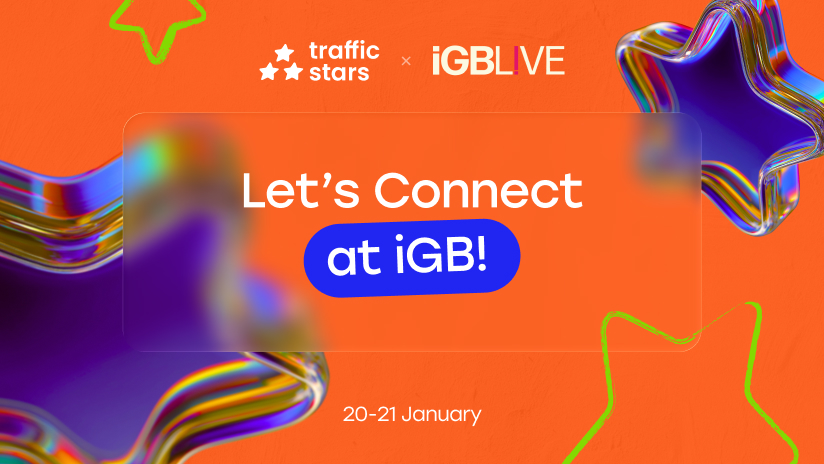
 (1).jpg)